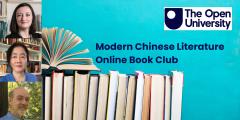Modern Chinese Literature Online Book Club - Session 7
- Dates
- Friday, April 12, 2024 - 13:00 to 14:00
-
Location
- Online via MS Teams
-
Contact
[email protected]
Please join us for session 7 of the Modern Chinese Literature Online Book Club. All are welcome to attend and you do not need to have attended any of our prior book club sessions. The session is informal, friendly and held in English on MS Teams.
In this session with Paper Republic, we will be discussing Mister Lover by Wang Xiaobo and translated by Eric Abrahemsen. This story is one of a collection of “Tales of the Tang” by Wang Xiaobo: stories ostensibly set in the Tang Dynasty, but peppered through with suspiciously modern elements. Please read the story (in the link above) before the session.
You can read the chinese version of the story here or download the PDF to read offline. The English version is in the link above.
About the faciliators:
Emily Jones - Emily Jones is a founding Trustee of Paper Republic, a charity which promotes Chinese literature in English translation. She is a graduate of Chinese Studies from the University of Cambridge (1998 - 2002). She also studied Chinese at the Chinese universities of Ningbo and Qingdao and was the recipient of a British Centre for Literary Translation mentorship in translation in 2011. Her publications include novels such as Black Holes (性之罪 ) by He Jiahong (何家弘); short stories such as Fiction and Other Stories (李喬短篇小說精選集) by Lee Chiao (李喬), as well as poetry.
We are delighted that two translators familiar with Wang Xiaobo's work will be joining us for the session, Jason Sommer and Zhang Hongling
Their translations of Wang Xiaobo were published by State University of New York Press in 2007 in the volume titled Wang in Love and Bondage: Three Novellas by Wang Xiaobo. The novellas in that collection are "2015," "The Golden Age," and "East Palace, West Palace," the third being the title of the film adaptation of "Sentiments Like Water." As we note in the book's introduction, the story was written expressly for the film, virtually simultaneously, and the film was responsible for perhaps Wang's widest recognition in the west.
Hongling also wrote an article in 2021, published by The China Project on the anniversary of his death. The article, titled 'The yin and yang worlds of a Chinese Literary Outlier' offers some insights into his life and writings. You may want to read this for further background on Wang Xiaobo.
https://thechinaproject.com/2021/04/09/the-yin-and-yang-worlds-of-a-chinese-literary-outlier/
Jason Sommer’s latest publication is the memoir Shmuel’s Bridge: Following the Tracks to Auschwitz with My Survivor Father. He is author of five poetry collections: most recently Portulans in the University of Chicago Press’s Phoenix Poets Series. A former Stegner Fellow in Poetry at Stanford University, Sommer has won a Whiting Foundation Writers’ Award and has held fellowships at the Bread Loaf and Sewanee writer’s conferences. He has published translations of Irish language poems and, with Hongling Zhang, collaborative book-length translations of Chinese fiction: Wang in Love and Bondage: Three Novellas by Wang Xiaobo and The Bathing Women by Tie Ning, which was longlisted for the Man Asia Literary Prize.
Please register here on Eventbrite to attend.
Questions to consider for discussion ( you don't need to prepare answers to them all!)
1. Do you think the Emperor's bracelet has symbolic meaning? Does the meaning of the bracelet change over the course of the tale as it is referenced a number of times? What is the root of the Emperor's unhappiness? Why can the bracelet make him happy?
2. The novel defines Xiao Qing's love as "green love". What kind of love do you think that is? If we were to use a colour to define the love of Wang An's wife, what colour do you think would be appropriate? What about the Empress's love for the Emperor? How are these three colours of love different?
3. Wang An's wife understands love as the relationship between a boat and water, while Xiao Qing understands love as the snow-white skelaton in the green grass of the deep mountains. How do you interpret these two metaphors? Which metaphor for love resonates more with you?
4. Do you think this novel by Wang Xiaobo is male-centric? Is the love that Wang An's wife and Xiao Qing have for Wang An, an adoration of patriarchy or a subversion of it?
5. Have you noticed that recurrence itself as a structural device? Take the successive threats of punishment and actual punishment as an example: what does it mean in the story and how does the meaning alter with recurrence (if it does)?
For those who wish to explore more of Wang Xiaobo's work after the session, you may be interested in this book (not affiliated with amazon). For those of you who want to read the description of this event in Chinese, click this link.
*Update 18/04/24*
The recording is now available below and you can read the transcript from the event here.
Contact Us
Online Confucius Institute office
Stuart Hall Building
The Open University
Walton Hall
Milton Keynes
MK7 6AA
Email: [email protected]
